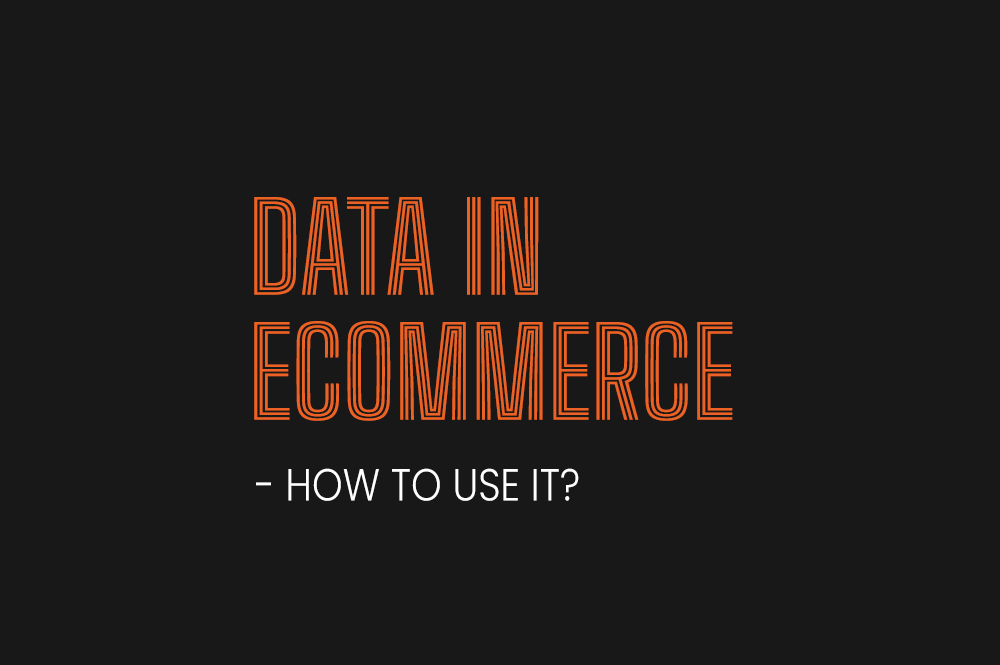Blog Fast White Cat
DATA IN ECOMMERCE — GETTING TO KNOW YOUR CUSTOMERS BETTER
Karolina Obszyńska Aug 24. 2023
What would the world look like without the internet? It's hard to imagine, especially now, in the era of digitalization, where we spend an average of 51 hours of our free time online each week. The internet is a vast realm of data. Imagine that in just 48 hours, it accumulates more information than humanity has gathered since the beginning of the world. How can you use this to effectively enhance your business? Get to know data in eCommerce, which will help you learn more about your customers.
According to a study conducted by Mediapanel in June 2022, there are 29.8 million active internet users aged 7 to 75 in Poland. That's nearly 30 million people ready to make purchases in your online store. Hence, it's worth contemplating how to directly reach your target audience with your products or services. However, data analysis must be approached skillfully and with the use of appropriate tools. An online store is not just about user-friendly UX and well-presented products. The most significant activities occur precisely where the customer's sight doesn't reach — where data is gathered.
Every online store owner should focus on properly collecting data about their customers right from the frontend. What does this mean?
The beginning of 2023 is the last call to implement Google Analytics 4 correctly into your business. In a few months, data will no longer be stored in the older version of Analytics, which will result in, among other things, the inability to compare year-to-year data (a crucial function for eCommerce that aids in detailed business development observation on a large scale!).
The possibilities that Google Analytics 4 offers (with proper implementation) in eCommerce are enormous. It's a true mine of knowledge about customer behavior and traffic. Therefore, when selecting tools, Google Analytics should not be overlooked. Many people believe that analytics for an online store just need to be "hooked up." This is an incorrect formulation. This is particularly true when considering the power of the so-called GA. Thus, it's best to think of this process as an "integration." Of course, changing the term is merely symbolic in emphasizing the essence of this tool. In reality, a well-implemented Google Analytics integration in your eCommerce is a process that, through events, gathers essential information for you.
Google Analytics 4 is a new solution that differs from the well-known Universal Analytics. Although the tool is not yet 100% perfected and continuous improvements and functionalities are being introduced, for businesses, it means one thing: you must continually monitor the introduced changes, observe trends, and draw conclusions.
Collecting cookie consents is another must-have on the eCommerce analytics list. Saving cookie files is an almost imperceptible action from the customer's viewpoint, but it's very engaging from the marketing perspective and for GDPR in an online store. Properly implementing the rules of operation, data collection, and utilization requires implementing mechanisms that allow for correct and legal processing and reporting of this data.
PROTIP! The types of consents placed in the online store that the consumer can check when making a purchase are crucial. They determine the further possibility of communication with the customer!
Marketing Consent: This allows you to "track" the consumer's online movements and display retargeting campaigns — for example, recommending additional or similar products.
Consents used for analysis: These allow you to see how a particular person navigates through your site and understand where and perhaps why they abandoned a purchase.
A very important aspect regarding cookie files is the consent mode. Consent mode should be implemented on all pages using, among others, Google Ads, Google Analytics, Facebook Ads, or other popular marketing systems. Incorrect implementation can lead to the blocking of ad accounts and decrease reach. Proper consent mode implementation allows you to "have the cookie" — in this case, access a wealth of data and "eat the cookie" — extract as much information as possible from that data to increase sales in your online store.
With data, you know everything. You can be an omnibus in eCommerce that cleverly turns acquired information into profits. "Omnibus" is also the name of a new directive that officially came into effect at the beginning of 2023. What does this directive change in terms of eCommerce platform operations?
When an e-store owner lowers the price of a product, they are obligated to inform the customer of the lowest price of the item within the last 30 days. This action aims to prevent price manipulation and the creation of artificial promotions.
Businesses based on marketplace sales are obligated to inform their customers about the seller's status — whether it's a business or a non-business entity.
An entrepreneur using sponsored offers — promoting certain services or products to make them appear higher in search results — should inform their customers about this action.
Learn more about the changes associated with the introduction of the Omnibus Directive from the entry: Omnibus Directive – Prepare Your eCommerce!
One thing is certain — these new regulations should be incorporated into both your current promotional strategies and in your terms and conditions, as well as on eCommerce platforms. At Fast White Cat, we support our partners in adopting the Omnibus Directive correctly by implementing appropriate modules in their online stores that will operate in accordance with the new directive's guidelines, including automatically displaying prices from the last 30 days.
Contact us, and we'll advise you on how to effectively use data in eCommerce and enhance your entire e-business: info@fastwhitecat.com.
Reach 30 million of your customers - analyze data in eCommerce, and it will be granted to you!
According to a study conducted by Mediapanel in June 2022, there are 29.8 million active internet users aged 7 to 75 in Poland. That's nearly 30 million people ready to make purchases in your online store. Hence, it's worth contemplating how to directly reach your target audience with your products or services. However, data analysis must be approached skillfully and with the use of appropriate tools. An online store is not just about user-friendly UX and well-presented products. The most significant activities occur precisely where the customer's sight doesn't reach — where data is gathered.
Google Analytics 4 - the best source of customer data
Every online store owner should focus on properly collecting data about their customers right from the frontend. What does this mean?
The beginning of 2023 is the last call to implement Google Analytics 4 correctly into your business. In a few months, data will no longer be stored in the older version of Analytics, which will result in, among other things, the inability to compare year-to-year data (a crucial function for eCommerce that aids in detailed business development observation on a large scale!).
The possibilities that Google Analytics 4 offers (with proper implementation) in eCommerce are enormous. It's a true mine of knowledge about customer behavior and traffic. Therefore, when selecting tools, Google Analytics should not be overlooked. Many people believe that analytics for an online store just need to be "hooked up." This is an incorrect formulation. This is particularly true when considering the power of the so-called GA. Thus, it's best to think of this process as an "integration." Of course, changing the term is merely symbolic in emphasizing the essence of this tool. In reality, a well-implemented Google Analytics integration in your eCommerce is a process that, through events, gathers essential information for you.
Google Analytics 4 is a new solution that differs from the well-known Universal Analytics. Although the tool is not yet 100% perfected and continuous improvements and functionalities are being introduced, for businesses, it means one thing: you must continually monitor the introduced changes, observe trends, and draw conclusions.
Recipe for good cookies — data in eCommerce
Collecting cookie consents is another must-have on the eCommerce analytics list. Saving cookie files is an almost imperceptible action from the customer's viewpoint, but it's very engaging from the marketing perspective and for GDPR in an online store. Properly implementing the rules of operation, data collection, and utilization requires implementing mechanisms that allow for correct and legal processing and reporting of this data.
PROTIP! The types of consents placed in the online store that the consumer can check when making a purchase are crucial. They determine the further possibility of communication with the customer!
Marketing Consent: This allows you to "track" the consumer's online movements and display retargeting campaigns — for example, recommending additional or similar products.
Consents used for analysis: These allow you to see how a particular person navigates through your site and understand where and perhaps why they abandoned a purchase.
Switch to Consent Mode
A very important aspect regarding cookie files is the consent mode. Consent mode should be implemented on all pages using, among others, Google Ads, Google Analytics, Facebook Ads, or other popular marketing systems. Incorrect implementation can lead to the blocking of ad accounts and decrease reach. Proper consent mode implementation allows you to "have the cookie" — in this case, access a wealth of data and "eat the cookie" — extract as much information as possible from that data to increase sales in your online store.
Become an omnibus — act within the law
With data, you know everything. You can be an omnibus in eCommerce that cleverly turns acquired information into profits. "Omnibus" is also the name of a new directive that officially came into effect at the beginning of 2023. What does this directive change in terms of eCommerce platform operations?
When an e-store owner lowers the price of a product, they are obligated to inform the customer of the lowest price of the item within the last 30 days. This action aims to prevent price manipulation and the creation of artificial promotions.
Businesses based on marketplace sales are obligated to inform their customers about the seller's status — whether it's a business or a non-business entity.
An entrepreneur using sponsored offers — promoting certain services or products to make them appear higher in search results — should inform their customers about this action.
Learn more about the changes associated with the introduction of the Omnibus Directive from the entry: Omnibus Directive – Prepare Your eCommerce!
One thing is certain — these new regulations should be incorporated into both your current promotional strategies and in your terms and conditions, as well as on eCommerce platforms. At Fast White Cat, we support our partners in adopting the Omnibus Directive correctly by implementing appropriate modules in their online stores that will operate in accordance with the new directive's guidelines, including automatically displaying prices from the last 30 days.
How to utilize data in eCommerce?
Contact us, and we'll advise you on how to effectively use data in eCommerce and enhance your entire e-business: info@fastwhitecat.com.



